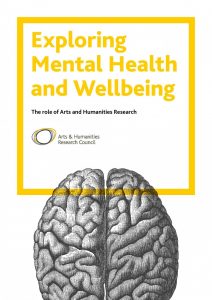 A new report, Exploring Mental Health and Wellbeing, published by the Arts and Humanities Research Council highlights the important role that arts and humanities based research can play in helping to address complex issues around mental health.
A new report, Exploring Mental Health and Wellbeing, published by the Arts and Humanities Research Council highlights the important role that arts and humanities based research can play in helping to address complex issues around mental health.
The report brings to life a wealth of case studies that are contributing to the mental health debate. These include examining the work of academics at the University of Cambridge who are pioneering an innovative design of a personalised fragrance dispenser to help manage anxiety to a project being managed by the University of Essex to educate policy-makers on the issues surrounding impaired decision-making capacity.
Research around mental health is focused around developing a cross-disciplinary approach – and arts and humanities scholars have a key role to play. The AHRC has funded research in many different aspects of mental health research in recent years, with an investment of over £10m in seventy-six projects since 2010.
The new cross-disciplinary mental health research agenda sees the UK’s seven research councils joining forces to collaborate on mental health research. Published in August this year, the agenda paves the way for cross-council collaboration on mental health, highlighting the importance of including the arts and humanities in this area of research.
 UK Research Councils join forces on mental health
UK Research Councils join forces on mental health










 Fourth INRC Symposium: From Clinical Applications to Neuro-Inspired Computation
Fourth INRC Symposium: From Clinical Applications to Neuro-Inspired Computation ESRC Festival of Social Science 2025 – Reflecting back and looking ahead to 2026
ESRC Festival of Social Science 2025 – Reflecting back and looking ahead to 2026 3C Event: Research Culture, Community & Cookies – Tuesday 13 January 10-11am
3C Event: Research Culture, Community & Cookies – Tuesday 13 January 10-11am Dr. Chloe Casey on Sky News
Dr. Chloe Casey on Sky News Final Bournemouth University publication of 2025
Final Bournemouth University publication of 2025 ECR Funding Open Call: Research Culture & Community Grant – Application Deadline Friday 12 December
ECR Funding Open Call: Research Culture & Community Grant – Application Deadline Friday 12 December MSCA Postdoctoral Fellowships 2025 Call
MSCA Postdoctoral Fellowships 2025 Call ERC Advanced Grant 2025 Webinar
ERC Advanced Grant 2025 Webinar Horizon Europe Work Programme 2025 Published
Horizon Europe Work Programme 2025 Published Update on UKRO services
Update on UKRO services European research project exploring use of ‘virtual twins’ to better manage metabolic associated fatty liver disease
European research project exploring use of ‘virtual twins’ to better manage metabolic associated fatty liver disease